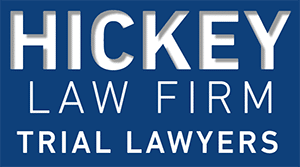Hickey Law Firm Fights Second Depositions of Clients
 When you file a lawsuit because of a boat or car crash, you will have to sit for a deposition. That is where the attorney for the Defendant, the company you sued, asks you questions in the presence of a court reporter. Everything you say and everything anyone says is transcribed. And the testimony is under oath. That is, you are sworn to tell the truth.
When you file a lawsuit because of a boat or car crash, you will have to sit for a deposition. That is where the attorney for the Defendant, the company you sued, asks you questions in the presence of a court reporter. Everything you say and everything anyone says is transcribed. And the testimony is under oath. That is, you are sworn to tell the truth.
The purpose of depositions is to let the other side know what the story is and how bad your injuries are. And the purpose is to see if the attorney on the other side can trip you up and make you say something which contradicts your medical records, other documents, or witnesses.
Depositions are important. They are also grueling. Depositions last several hours. And they are intense. The format is question and answer. The format is not conversational. The witness has to listen to each question carefully and answer it. That sounds easy. But it is difficult. When the questions come at rapid fire for hours and are tricky or ambiguous or hard to answer briefly, one hour of deposition can be exhausting. Several hours is extremely exhausting.
Hickey Law Firm is representing a woman and her husband who were passengers in a high speed 1,700 HP boat which crashed into a jetty one night outside the inlet to Port Everglades, Florida. The driver of the boat took out the boat at night and chose not to use GPS or radar. And he chose to drive the boat fast in an area known to have jetties and markers and other obstructions.
When the boat hit the jetty, it went up onto the rocks. These 2 passengers were thrown out of the boat and onto the rocks. The woman suffered “skull fractures, traumatic brain injury, midline shift of the brain, brain bleeding,” and other catastrophic injuries to her face, legs, and ribs. As of this writing, she has undergone two separate surgeries on her brain: “a right craniotomy for evacuation of epidural hematoma and elevation of distressed skull fracture. She has also undergone 2 surgeries on her injured knee. This woman will suffer the affects of these injuries for the rest of her life.
Both of the people brought suit against the driver for this horribly negligent and reckless driving. They were thoroughly deposed. The defendant driver’s attorney took the deposition of the wife for 4.5 hours and the husband for 3 hours.
The driver of the boat was also charged by the State of Florida with a crime, operating the boat in violation of the Inland Rules of the Road for navigation of boats. Those charges are now only misdemeanors. In misdemeanor only cases in Florida, the defendant is allowed to take any depositions only if he shows good cause*. In this case, the Court has allowed those depositions over our objections. We are considering an appeal.
The driver of a boat or car which crashes can be charged with a crime if he is boating under the influence (BUI), driving under the influence (DUI), drives carelessly or recklessly, or violates the Inland or International Rules of the Road for boating. The victims, that is, the injured people are allowed to participate in the criminal proceeding against the driver. In Florida there is a Florida Crime Victims Bill of Rights which is in Article 1, Section 16 of the Florida Constitution. That Bill of Rights provides among other things that the victims have a right to be free from harassment by the criminal defendant. Certainly redeposing someone on the exact same issues as they testified in another case is harassment. There is no other reason to redepose these people.
*MISEDEMEANOR DEPOSITIONS ARE NOT PERMITTED UNLESS GOOD CAUSE SHOWN.
Florida rule 3.220 does not permitted depositions in misdemeanors unless good cause can be shown. The rule provides:
No deposition shall be taken in a case in which the defendant is charged only with a misdemeanor or criminal traffic offense when all other discovery provided by the rule has been complied with unless good cause can be shown to the trial court. In determining whether to allow a deposition, the court should consider the consequences to the defendant, the complexity of the issues involved, the complexity of the witness’ testimony (e.g., experts), and the other opportunities available to the defendant to discover the information sought by deposition…
(emphasis added) See Fla. R. Crim. P. 3.220(h)(1)(D). The Defendant has not and cannot show good cause.
Jan L. Jacobowitz, who is an independent ethics consultant at Legal Ethics Advisor and Adjunct Professor at the University of Miami School of Law – and who is not involved in this case at all – explained to a reporter for the South Florida Daily Business Review:
“The legal ethics rules prohibit both frivolous discovery requests and conduct that is ‘prejudicial to the administration of justice, including to knowingly, or through callous indifference, disparage, humiliate, or discriminate against litigants,’” she said.
The rules also prohibit lawyers from engaging in unreasonable or intentional litigation delays, Jacobowitz said.
She said, “If depositions are being scheduled for a purpose other than a legitimate discovery request then not only may the court grant the motion, but also the scheduling of the depositions would fall outside of permissible legal ethics parameters.”
Hickey Law Firm represents catastrophic injury clients in Miami and throughout Florida. We represent cruise ship injury clients around the country. Please call us or fill out our contact form for more information.
Nobody Fights Harder. Nobody Fights Smarter. Nobody.®
Hickey Law Firm – Call us today.

Attorney John H. (Jack) Hickey and his team handle a wide range of cases, including but not limited to cruise ship accidents, admiralty and maritime accident cases, medical malpractice, wrongful death, premises liability, railroad accidents and car accidents. We represent victims from all over the nation, the world and the state of Florida.
Read more about how Jack Hickey can help you.

